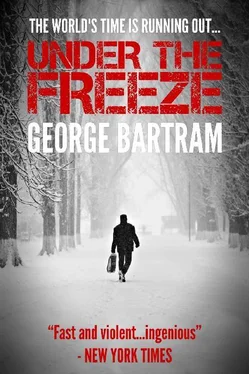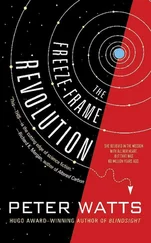He ripped all the gauze from the bottom of the spring, splashed her cologne over it, and put it on the windowsill with some of the plastic from the mattress cover. The old matches did not light very well, but he got the gauze smoldering and closed the window on it, leaving only a crack to make a draft to feed the fire. Still, it almost went out; then it blazed, and it began to smolder the way he wanted. He opened the window and crumbled some of the yellow foam from the mattress into it, and the smoke turned an ugly green and looked as thick as sewer water.
Tarp propped the flimsy chair under the door handle. He ran some water into the bucket with his urine and set it near the bed, where he could reach it quickly. He fed more foam and more cologne to the fire and watched the smoke drift out through the lattice over the window. He looked up at the smoke detector on the ceiling, which, he thought, symbolized as well as anything could the difference between Juana’s Havana and George Raft’s.
He could see flame at the bottom of the thick smoke, but he had no way of slowing it now. The paint on the bottom of the window was blistering, and as he watched, one pane of glass cracked from the heat.
A building like this one was like a village. Natural affinity and government nosiness made the people almost pathologically aware of each other. It had its own court system for minor “errors” (with Juana the judge); people were always on watch for others’ transgressions. A fire would be a great event. It would offer the thrill of danger, the pleasure of somebody else’s mistake, the titillation of damage to government property. There might even be revisionist or anti-revolutionary meaning in it — the secret cooking of black market food or the operation of an illegal still. That the apartment where the fire started was that of the head of the CDR was even more exciting. There had to be people in the building who would be thrilled by any sign of her failure — men who had wanted her and been rejected, women who disliked her because she was a new kind of Cuban woman, political rivals.
They have to notice soon , he thought.
He heard the muffled pounding of running feet on the floor above.
He waited.
He heard a voice far away. Then another voice, perhaps in the street below.
Suddenly there was a loud voice in the room just outside and a noise like a chair or a table being pushed aside. Several voices were raised then excitedly. He heard a thump and then a strange brushing sound on the door, and he imagined one of his guards putting his back to the bedroom door to keep the nosy neighbors out.
The air in the room grew stifling. The smell of burning plastic attacked his nose, the back of his throat. He coughed. He was thinking of the poisonous gases that could be made by burning plastic. He closed his mind to that and impaled a paper label from the mattress on his improvised club, set it afire, and held it up under the smoke alarm. It screamed like a hurt rabbit.
“Fire!” Tarp shouted in Spanish. “Help me! Help. Help. Oh, Jesu, help me!” While he shouted he was opening the window and tearing down a curtain to drop it on the burning pile on the window ledge. He rubbed soot from the ledge on his hands and face.
“Comrades, for Jesu’s sake! Help!”
The door handle rattled.
He picked up the pail of watery urine.
The door was pushed in an inch and stopped by the chair. Somebody was bellowing outside.
“Help me, Comrades!” he shouted into the gap.
The door crashed as two men broke the back of the fragile chair. Tarp would remember their faces after — sweating, intense, the faces of good men trying to do good — and then he looked beyond them and saw the poet.
“Fire!” Tarp bellowed, and he threw the pail of liquid over the heads of the first two men and directly at the slender intellectual.
The smoke and the smell in the room were bad, and the first two men covered their noses with one hand while they grabbed him with the other and pushed him out; one of them stayed long enough to look around so that he could make a full report of it later.
“Fire, fire!” Tarp was shouting as he came rushing out of the room, trailing wisps of plastic poison, and as he came past the poet he brought his left fist up solidly into the abdomen and felt the young man fold up like an ironing board. Tarp wrapped his arms around him and dragged the young man along. “Victim of the fire,” he cried. “Make room — make room!”
He was looking for the other man, the thick one, the capable one; but he was not there. Perhaps he had called for help. There were a dozen other people in the room, however, and more looking in the doorway from the balcony. Tarp shoved through them. With his left hand, he was trying to find his gun on the young man. “Make room!” He pushed people back, but nobody seemed to care; they wanted to get past him so they could see what was going on.
He laid the young man down on the floor of the balcony, just under the big bulletin board of the Committee for the Defense of the Revolution.
“Victim of the fire,” he said to half a dozen people who came out of nowhere to stand around. “Smoke inhalation.”
“You were inside, Comrade?”
“The first to arrive. He was smoking in bed.”
“In la ciderista’s bed?” They began to look wide-eyed at each other at the thought of the young man in Juana’s bed.
“Open his shirt,” Tarp said. The young man was still unconscious. Tarp took off his shoes. “Make him cool!” he said. He backed away down the balcony with the shoes in his hands. The crowd went on growing; when he reached the stairs, there were people coming from the floors above and below, and the sick-animal wail of a fire truck was rising from the street. Tarp crouched in a doorway and put the shoes on without tying them and then bounded down the stairs feeling the shoes pinch and trying to ignore the discomfort.
* * *
He cleaned himself at a tin wall fountain and shaved at a public restroom, where an old black attendant found a discarded razor for him in the trash.
“On the move?” the old man said.
“Waiting for my ship to load.”
“A sailor. You are not from Havana, I can tell.”
“From Camagücy.”
“Ah.” He took a cigarette butt from a plastic bag. “I was in Camagücy once. That was before Fidel.” He lit the butt. “It was hard to be a black man in Cuba then. Now it is all right to be a black man.” He puffed. “You were very drunk last night?”
Tarp tried to smile. “Do I look it?”
“Too much rum and just enough woman, that is how you look.” He laughed, coughed on the smoke, drew the butt down to a fiery circle between his dark fingers. He wore a sweat-stained old T-shirt, and hanging around his neck was a string with a little bag that rested just in the hollow of his clavicle. Santerría , Tarp thought. The old religion . Magic . It must be interesting , believing in both santerría and the revolution . “You are happy in Havana now?” Tarp said as he wiped his hand on a paper towel.
“Very happy.”
“Nowhere you want to go anymore?”
Tarp made a move to throw the towel away, but the old man took it and smoothed it over his thigh. “I was in Florida once. That was in 1937. No, there is nowhere I want to go.”
“What was Florida like?”
“It was another place where it was not good to be a black man.” He put the smoothed-out towel to dry with half a dozen others.
“I have no money to give,” Tarp said.
“I know. You are a sailor.”
“I will trade shirts with you, if you like.”
They traded T-shirts. The old man studied himself in Juana’s bright-colored shirt and was pleased.
Читать дальше












